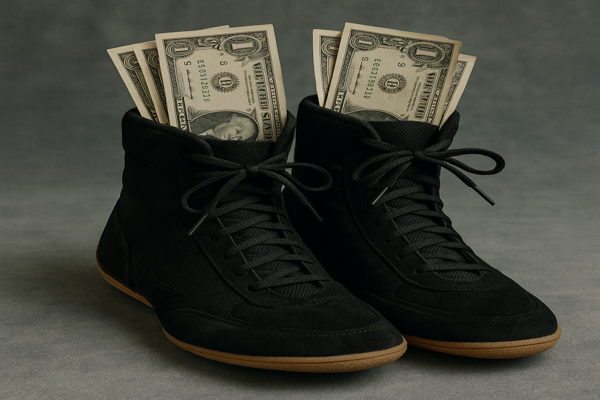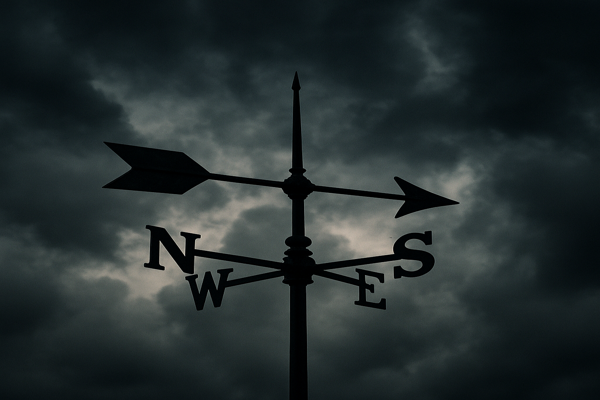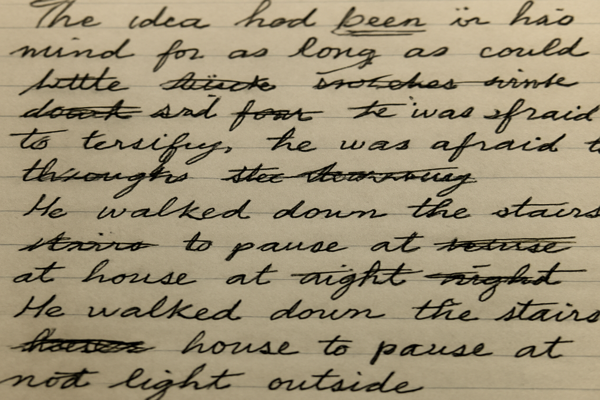My dad ran what he would have called a "relatively successful" landscaping business in Colby, Kansas. We had a roof over our heads and food on the table, though the roof belonged to a house that cost $16,000 and featured a front porch that listed slightly to the left, like it was perpetually trying to escape.
So when Dad came home one day with an actual chariot—as in, a vehicle from ancient Rome, as in something gladiators died in—none of us should have been surprised. This was, after all, the same man who'd once transported three horses on a flatbed trailer held together with rope and optimism.
"Twenty bucks!" he announced, practically vibrating with excitement. "Can you believe it? Twenty dollars for a piece of history!"
Mom took one look at the contraption parked in our driveway and went back inside. I heard the lock click. That was Mom's way of saying, "I'm not participating in whatever disaster is about to unfold."
The chariot looked like it had been rejected by the Roman Empire for being too dangerous. Made of wood and metal, with wheels that belonged in a museum labeled "Transportation Methods That Killed People," it creaked when you looked at it too hard. The platform where you stood was about as wide as a dinner table and significantly less stable.
"It's perfectly safe," Dad insisted, which in our family was basically a guarantee that someone was going to the emergency room.
The Maiden Voyage
Dad decided our maiden voyage should be through downtown Colby. On a Saturday. At noon. When everyone would be out.
"We need to show it off!" he explained, already hitching our horses to this wooden death trap. "What's the point of having a chariot if you don't show it off?"
He loaded us up—me on one side, my siblings Matt and Melissa squeezed onto the other—and off we went. We must have looked like the world's saddest gladiators, clip-clopping through residential streets while neighbors stopped mowing their lawns to stare.
Mrs. Henderson actually took off her glasses, cleaned them, and put them back on, as if the problem might be with her vision rather than the fact that the Murray family was cosplaying as ancient Romans on a Tuesday afternoon.
The dogs were our best audience. Every single one lost its mind with excitement, barking and running along fence lines like we were the most interesting thing they'd ever seen. Which, to be fair, we probably were. Colby wasn't exactly a hotbed of chariot activity.
Downtown Disaster
After an hour of dignified clip-clopping through the suburbs, Dad made a decision that would live in Murray family infamy.
"Let's take this thing downtown!"
If Mom had been there, she would have immediately pointed out that downtown Colby had actual traffic. And businesses. And people who might call the authorities. But Mom wasn't there, and we were drunk on the power of our noble steeds and our twenty-dollar chariot.
Downtown Colby's streets were made of old, uneven bricks—a detail Dad hadn't considered. As we trotted down Main Street, the chariot began bouncing and rattling with each brick, going from gentle bobs to full-blown jerks. It was like being on a mechanical bull that was also moving forward and could potentially crash into a storefront.
The sound was incredible. We weren't just clip-clopping anymore; we were creating a symphony of destruction. The wooden wheels clattered, the metal rims clanged, the entire structure groaned like it was reconsidering its life choices.
"This doesn't feel safe!" Melissa shrieked, her knuckles white from gripping the edge.
"It's all part of the experience!" Dad laughed, the kind of laugh that suggested he'd either achieved enlightenment or completely lost touch with reality.
The Wheel Incident
That's when disaster struck. Matt's shoelace—because of course it was a shoelace—somehow got caught in the spokes of the chariot's wheel. In the blink of an eye, he was yanked completely off the chariot, his leg pinned to the wheel as it spun.
"DAD!" Melissa and I yelled in unison.
"Oh, shit!" Dad shouted, yanking the reins.
But horses don't have emergency brakes. The wheel made two full revolutions, dragging poor Matt like a ragdoll, his leg getting squished repeatedly under the wheel with each rotation.
Right there, in the middle of downtown traffic, our grand entrance had turned into a spectacle of an entirely different kind. Cars pulled over. People got out to help. Dr. Hendricks—because of course the town doctor would witness our moment of peak Murray chaos—rushed over to where Matt lay tangled in the spokes.
"Are you alright, son?" he asked, kneeling beside him.
Matt, tough as nails even at six years old, just shrugged. "Yeah, I think so. My leg feels a little squashed."
He said it with the casual air of someone commenting on the weather.
The Cover-Up Attempt
After the Good Samaritans left and Dad had performed his "medical examination" (which consisted of poking Matt's leg and asking if he could wiggle his toes), he leaned down with a conspiratorial whisper.
"So, maybe we don't tell your mom about the whole 'dragged under the chariot' thing, okay?"
Matt and I exchanged glances. The entire downtown had just witnessed our disaster.
"Dad," Melissa said, gesturing at the dispersing crowd, "half the town just saw Matt get turned into a human wheel spoke."
"Actually, who am I kidding?" Dad sighed. "This is Colby. Half the town saw it happen. The other half will know by dinner."
The Homecoming
We pulled up to find Mom waiting on the porch, arms crossed, wearing that expression that meant she already knew everything.
"What happened?" she asked, zeroing in on Matt's limp and developing bruises.
"Well..." Dad began, rubbing the back of his neck. "There was a bit of a... chariot malfunction downtown."
Mom's eyes narrowed. "Jim. Did you say 'chariot malfunction'?"
I couldn't help it—I burst out laughing. The phrase "chariot malfunction" was so perfectly absurd, so quintessentially Dad, that it summed up our entire childhood in two words.
Matt chimed in with a play-by-play complete with sound effects. "And then my shoelace got caught, and I went around like this—WHOOSH—and then—BAM—and then—SCREECH—and then Dad said a bad word!"
"I said 'shoot,'" Dad protested weakly.
"You did not," all three of us kids said in unison.
The Aftermath
Mom's face cycled through horror, disbelief, and something that looked suspiciously like she was calculating how much it would cost to have Dad committed.
"I told you not to ride that thing," she said, trying not to laugh. "And now look—you nearly killed one of our kids."
"But he's fine!" Dad protested, gesturing at Matt, who was indeed fine, if significantly more streetwise about the dangers of shoelaces.
"That's not the point!"
"Then what is the point?"
"The point is that normal families don't have to unwrap their children from vehicle spokes!"
"Well," Dad said, his grin returning, "whoever said we were a normal family?"
The Legend Lives On
The chariot survived for a few more years, though our trips became noticeably less ambitious. We stuck to rural roads after that, far from the judging eyes of downtown Colby and its treacherous bricks.
But that twenty-dollar chariot gave us something worth more than safety or dignity: it gave us a story that perfectly captured what it meant to be a Murray. We were the family who did things differently, not because we were trying to be unique, but because Dad's brain simply didn't process "normal" as an option.
Years later, in college, when someone would ask about my childhood, I'd mention the chariot. Without fail, they'd think I was making it up.
"Nobody actually owns a chariot," they'd say.
"Nobody normal," I'd correct them. "But whoever said we were a normal family?"
And really, looking back, would I trade that embarrassing, dangerous, absolutely insane chariot ride for a normal childhood?
Ask me on a good day, and I'll say no. Those moments of spectacular failure, public humiliation, and near-death experiences became the stories that defined us. They taught us to find humor in chaos, to stick together when things went sideways (sometimes literally), and that love sometimes looks like a father trying to give his kids an adventure, even if that adventure occasionally requires medical attention.
Ask me on a bad day, though, and I might give you a different answer. Because the same impulsiveness that led to chariot purchases also led to manic episodes, broken windows, and nights when we slept in a pile on my sister's floor, afraid our family might shatter completely.
"But that's the thing about growing up with a bipolar parent—every story has multiple angles, every memory comes with contradictions, and every twenty-dollar chariot is both the best and worst thing that ever happened to you."
At least Matt's leg healed. Eventually.
And downtown Colby? Well, they still tell the story of the day the Murray kids rode through town in a chariot. Some details have been embellished over the years—in some versions, Matt did three complete rotations around the wheel, in others, the horses ran wild through the bank—but the heart of it remains true.
We were the family with the chariot. The family that turned disaster into adventure, embarrassment into entertainment, and somehow survived to laugh about it all.
Even if we probably shouldn't have.



